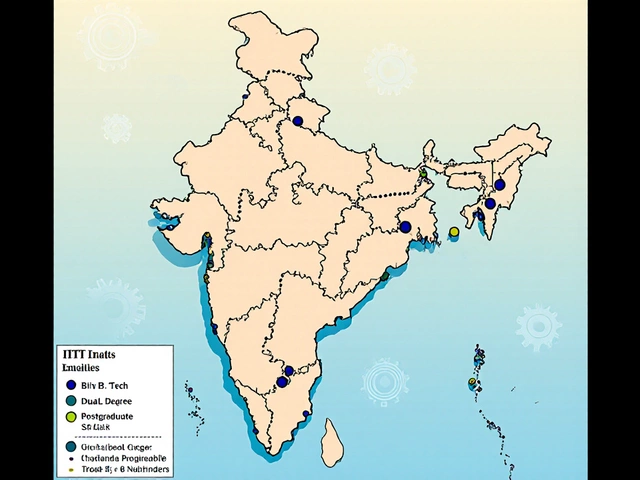NEET Topic Prioritization Tool
This tool helps you identify which NEET topics to focus on based on their historical importance and scoring potential. Enter your current coverage for each high-yield topic to see where to prioritize your study time.
Your NEET Coverage Report
Estimated Score: 0/720
Priority Areas to Focus:
Every year, over 2 million students in India take the NEET exam. Only about 15% of them get into a medical college. The difference between those who make it and those who don’t isn’t talent or luck-it’s what they studied and how they studied it. If you’re asking what is best to study for NEET, the answer isn’t a single book or a shortcut. It’s a clear, focused plan built around the official syllabus, smart time management, and relentless practice.
NEET is not about studying everything-it’s about studying the right things
Many students think they need to read every page of every textbook. That’s a trap. NEET tests your understanding of core concepts, not your ability to memorize. The exam covers Physics, Chemistry, and Biology (Botany and Zoology). But not all topics carry equal weight. Some topics appear every year. Others show up once every three years. Your job isn’t to cover everything. It’s to master what matters most.
From 2020 to 2025, the National Testing Agency (NTA) has consistently tested these high-yield areas:
- Biology: Human Physiology (18-20 questions), Genetics (8-10), Ecology (6-8), Plant Physiology (5-7)
- Chemistry: Organic Chemistry (12-15), Chemical Bonding (5-6), Coordination Compounds (4-5), Thermodynamics (3-4)
- Physics: Electrostatics and Current Electricity (10-12), Optics (5-6), Mechanics (8-10), Modern Physics (4-5)
That’s 80-85% of the paper right there. If you nail these, you’re already ahead of 70% of candidates. Don’t waste time on obscure topics like dimensional analysis in Physics or the history of atomic models in Chemistry. They rarely appear.
Start with NCERT-then go deeper
NCERT textbooks for Classes 11 and 12 are the foundation. Not because they’re easy, but because 70-80% of NEET questions come directly from them. Not paraphrased. Not reworded. Often, the exact same sentences appear in the exam.
Here’s how to use them:
- Read each chapter once slowly. Highlight key definitions, diagrams, and flowcharts.
- Do every in-text example and exercise. Don’t skip them.
- Make flashcards for reactions (Chemistry), processes (Biology), and formulas (Physics).
- Revise each chapter within 48 hours of reading it.
After you’ve mastered NCERT, move to one reliable reference book per subject. For Biology, use Trueman’s or MTG Fingertips. For Chemistry, OP Tandon or MS Chouhan. For Physics, HC Verma or DC Pandey. Pick one-don’t collect five. Using too many books creates confusion, not clarity.
Practice is not optional-it’s the only way to win
NEET is a speed test. You have 180 minutes for 180 questions. That’s 60 seconds per question. And 20% of those questions are tricky. You won’t solve them by thinking deeply-you’ll solve them by recognizing patterns.
Start solving previous year papers from 2019 onwards. Do at least one full paper every week. Time yourself strictly. After each test:
- Mark every wrong answer and understand why you got it wrong.
- Identify which topics you keep missing. Is it Genetics? Electrochemistry? Ray Optics? Drill those.
- Track your score trend. If you’re stuck at 550, figure out what’s holding you back.
By the time you reach the final month, you should be solving 2-3 mock tests a week. Use tests from Aakash, Allen, or NTA’s official mock series. Avoid random online quizzes. They don’t match NEET’s difficulty level or pattern.
Focus on Biology-it’s your biggest scoring opportunity
Biology gives you the most marks. 90 out of 180 questions. And it’s the most memorization-heavy. That makes it easier to improve quickly-if you study smart.
Here’s what works:
- Draw diagrams repeatedly-nephron, heart circulation, menstrual cycle. Don’t just look at them.
- Use mnemonics for long lists: "PANIC" for cranial nerves (Olfactory, Optic, Oculomotor, Trochlear, Trigeminal, Abducens, Facial, Vestibulocochlear, Glossopharyngeal, Vagus, Accessory, Hypoglossal).
- Learn by teaching. Explain each topic out loud as if teaching a friend. If you can’t explain it simply, you don’t understand it.
Don’t ignore Zoology. Many students focus only on Botany because it’s easier. But Zoology questions are often direct and high-scoring. Human Reproduction, Evolution, and Immunity are goldmines.

Chemistry: Master the patterns, not the pages
Chemistry is divided into three parts: Physical, Organic, and Inorganic. Each needs a different approach.
Physical Chemistry: Focus on formulas and units. Practice numerical problems daily. Know the derivation of key equations like Raoult’s Law, Van’t Hoff equation, and Nernst equation. Don’t memorize them-understand how they’re built.
Organic Chemistry: Reaction mechanisms matter more than memorizing reactions. Learn the flow: nucleophile attacks electrophile, carbocation stability, hyperconjugation. Use flowcharts to map reactions. If you know the mechanism, you can predict the product-even if you’ve never seen it before.
Inorganic Chemistry: This is memory-heavy, but predictable. Focus on periodic trends, transition metals, and coordination compounds. Memorize the color of complexes, magnetic properties, and oxidation states. Make a chart and stick it on your wall.
Physics: Think, don’t calculate
Physics questions in NEET are rarely about complex math. They test conceptual clarity. A question might give you a circuit and ask for the current. But if you understand Kirchhoff’s laws, you can solve it in 10 seconds.
Here’s how to improve:
- Draw diagrams for every problem-even if it seems simple.
- Learn the common traps: sign conventions in optics, direction of friction, vector resolution.
- Practice estimation. Many questions can be solved by eliminating impossible options. If a speed is 300 m/s in air, it can’t be 1000 m/s in a wire.
Don’t skip Modern Physics. It’s short, high-scoring, and often the easiest part of the paper. Topics like photoelectric effect, Bohr’s model, and nuclear decay appear every year.
Study schedule: 8 hours a day, not 12
Studying 16 hours a day doesn’t make you smarter. It makes you tired. The most successful NEET toppers study 7-8 focused hours a day. The rest of the time is for rest, revision, and recovery.
Here’s a sample daily routine that works:
- 6:30 AM - Wake up, light exercise, breakfast
- 7:30 AM - 10:30 AM - Physics (new topic + practice)
- 10:30 AM - 11:00 AM - Break
- 11:00 AM - 1:00 PM - Chemistry (theory + reactions)
- 1:00 PM - 2:30 PM - Lunch + nap
- 2:30 PM - 4:30 PM - Biology (diagrams + NCERT)
- 4:30 PM - 5:00 PM - Break
- 5:00 PM - 6:30 PM - Mock test or previous year paper
- 6:30 PM - 7:30 PM - Review mistakes
- 8:00 PM - Wind down, no screens
Every Sunday, take a full mock test. The rest of the day? Review your weak areas. Don’t study new topics on Sundays.

What to avoid at all costs
Here are the biggest mistakes students make:
- Ignoring NCERT and jumping to advanced books
- Watching YouTube videos instead of practicing
- Trying to cover 10 subjects in 3 months
- Comparing your progress with others
- Skipping sleep to study more
NEET is not a race. It’s a marathon with a finish line you can reach if you run steady.
Final tip: Your mindset matters more than your notes
The students who crack NEET aren’t the smartest. They’re the most consistent. They show up every day. They fix their mistakes. They don’t quit when they score low in a mock test. They ask: What did I miss? not Why am I failing?
Believe in the process. Trust the syllabus. Stick to your plan. And remember-every question you get right in practice is one less you’ll get wrong on exam day.
Is NCERT enough for NEET preparation?
Yes, NCERT is enough to clear NEET and score above 600 if you master every line, diagram, and example. But to score 650+, you need one additional reference book per subject for deeper practice. NCERT gives you the foundation; practice gives you the edge.
How many hours should I study daily for NEET?
8 focused hours is ideal. Quality matters more than quantity. Studying 12 hours while distracted or exhausted leads to burnout. Better to study 8 hours with full attention, then rest. Sleep improves memory consolidation. Your brain needs downtime to lock in what you learned.
Which subject has the highest weightage in NEET?
Biology has the highest weightage with 90 questions (360 marks). Physics and Chemistry each have 45 questions (180 marks). But Biology is also the easiest to improve in because it’s mostly direct from NCERT. Mastering Biology can boost your score by 100+ marks faster than Physics or Chemistry.
Can I crack NEET without coaching?
Yes, thousands of students crack NEET without coaching every year. What matters is discipline, access to good study material (NCERT, previous papers), and a structured plan. Coaching helps with motivation and test series, but it’s not a magic solution. If you’re self-motivated and consistent, you can do it alone.
When should I start solving mock tests?
Start after you’ve completed the first round of NCERT for all subjects-usually by October of Class 12. Begin with one test per month, then increase to weekly by January. Don’t take mocks too early. You need foundational knowledge to benefit from them. Early mocks are for diagnostics, not scoring.
Is it better to study at night or morning for NEET?
There’s no universal best time. Study when your brain is sharpest. Most students find mornings better for problem-solving (Physics, Chemistry) and evenings for memorization (Biology). But if you’re a night person, use that time. Just stick to a fixed schedule. Consistency trains your brain to be ready at the same time every day.
Next steps: Build your plan today
Don’t wait for the perfect time. Start now. Open your NCERT Biology book. Read the first page of Chapter 1. Highlight one key term. Write down one question you don’t understand. That’s your first step.
NEET doesn’t reward the brightest. It rewards the most prepared. And preparation isn’t about how long you study-it’s about how clearly you think, how accurately you recall, and how consistently you show up.









0 Comments